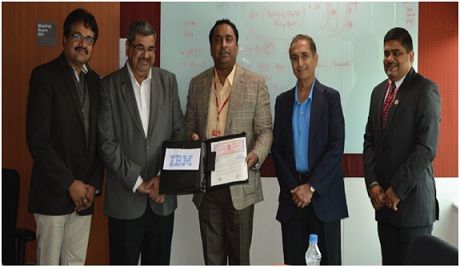About the Course
The confluence of academia and industries is inevitable in the growing field of Computer Science. HITS, has come out with a novel solution of running B.Tech courses aligned with industrial standards along with the industrial leader IBM.
This course is enhanced with electives on cloud computing and virtualization designed by IBM. The labs of the department is well equipped to carry out demonstrations and practical sessions in cloud computing and virtualization. On completion of the program every students will receive a digital badge from IBM along with the degree.
Career opportunities:
- Cloud System Administration
- Cloud Security Specialists.
- Cloud Application Development/Maintenance/Testing.
COLLABORATION WITH IBM
IBM ICE Collaborative, Industry Ready Programs on Current and Futuristic technology to enrich curriculum with industry aligned course for Engineering Students.
FEATURES OF THE COURSE:
- 1 Industrial Visit with Dell, 1 Industrial Visit Planned to IBM Bangalore
- Train-The-Trainer (T3) Program to develop expertise with HITS Staff on Cloud Computing & Virtualization
- 12 Training Programs/Seminars/GLs/Webinars and Interactive Sessions are conducted by IBM & their partners.
FEATURES OF IBM CLASSES
- Interactive sessions, Group Discussions & Role Plays
- Assignments on latest trends and tools
- E-Learning Methods & ITrack Online Portal
IBM DESIGNED ELECTIVES
- Introduction to Open Source Software and Open Standards
- Introduction to IT infrastructure Landscape
- Introduction to Virtualization and Cloud Computing
- Virtualization Lab
- Cloud Computing Architecture
- Business Intelligence
- Web Programming through PHP & HTML
- Web Programming Laboratory
- Cloud Deployment Model (Cloud Deployment Lab)
- Backup & Disaster Recovery
- Business Process Management (BPM lab)
- Cloud Performance Tuning
- Cloud Performance Lab
- Managing the Cloud
- Systems Modeling using System Dynamics
- Projects with IBM
PEO, PO & PSO
PROGRAMME EDUCATIONAL OBJECTIVES (PEO)
The Program Educational Objectives (PEOs) of the Computer Science and Engineering are listed below: The graduate after 3-5 years of programme completion will
- PEO1: Excel in his/her professional career and/or pursue higher education including research by applying the knowledge of Computer Science and Engineering.
- PEO2: Demonstrate the technical skills to analyze and design appropriate solutions for problems with social consciousness and ethical values.
- PEO3: Adapt themselves to organizational needs by understanding the dynamically changing technologies.
PROGRAM OUTCOMES (ALIGNED WITH GRADUATE ATTRIBUTES) (PO)
(To be achieved by the student after every semester/year/and at the time of graduation) At the end of this program, graduates will be able to
- PO1: Engineering knowledge: Apply the knowledge of mathematics, science, engineering fundamentals, and an engineering specialization to the solution of complex engineering problems.
- PO2: Problem analysis: Identify, formulate, review research literature, and analyze complex engineering problems reaching substantiated conclusions using first principles of mathematics, natural sciences, and engineering sciences.
- PO3: Design/development of solutions: Design solutions for complex engineering problems and design system components or processes that meet the specified needs with appropriate consideration for the public health and safety, and the cultural, societal, and environmental considerations.
- PO4: Conduct investigations of complex problems: Use research-based knowledge and research methods including design of experiments, analysis and interpretation of data, and synthesis of the information to provide valid conclusions.
- PO5: Modern tool usage: Create, select, and apply appropriate techniques, resources, and modern engineering and IT tools including prediction and modeling to complex engineering activities with an understanding of the limitations.
- PO6: The engineer and society: Apply reasoning informed by the contextual knowledge to assess societal, health, safety, legal and cultural issues and the consequent responsibilities relevant to the professional engineering practice.
- PO7: Environment and sustainability: Understand the impact of the professional engineering solutions in societal and environmental contexts, and demonstrate the knowledge of, and need for sustainable development.
- PO8: Ethics: Apply ethical principles and commit to professional ethics and responsibilities and norms of the engineering practice.
- PO9: Individual and team work: Function effectively as an individual, and as a member or leader in diverse teams, and in multidisciplinary settings.
- PO10: Communication: Communicate effectively on complex engineering activities with the engineering community and with society at large, such as, being able to comprehend and write effective reports and design documentation, make effective presentations, and give and receive clear instructions.
- PO11: Project management and finance: Demonstrate knowledge and understanding of the engineering and management principles and apply these to one’s own work, as a member and leader in a team, to manage projects and in multidisciplinary environments.
- PO12: Life-long learning: Recognize the need for, and have the preparation and ability to engage in independent and life-long learning in the broadest context of technological change.
PROGRAM SPECIFIC OUTCOMES (PSO)
On completion of the B.Tech. Computer Science & Engineering degree the graduates will be able to
- PSO1: Apply mathematical, conceptual knowledge of computing and analytical skills to solve complex problems.
- PSO2: Design and develop computer systems based on the domains of Cyber Physical Systems, Algorithm Design Techniques and Enterprise systems security.
- PSO3: Do innovative system design with analytical knowledge by developing modern tools and techniques.
